Challenging but extremely rewarding and eye-opening. Past Review
By Claire H (Neurobiology and Neurosciences., Trinity University) - abroad from 07/29/2013 to 12/11/2013 with
CIEE: Gaborone - Community Public Health
I learned so much from this experience that it is difficult to put into words. While it was extremely challenging and frustrating at times, it was 100% worthwhile and I would recommend a study abroad experience to anyone that is able to do so. I learned that while I am extremely blessed with my life in America, I do not need as much as I thought I did to live happily and healthily. I learned that I am capable of taking on any experience that life presents me, and I have become extremely independent and skilled at handling stress and crises. Lastly, I learned what it is truly like to be a minority and at times, a discriminated minority. All of these lessons have changed my perspective on life and have made me a much better, more well-rounded person.
Review Photos
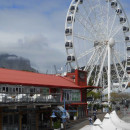
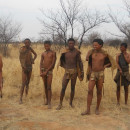
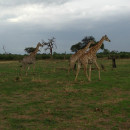
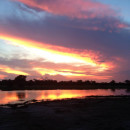
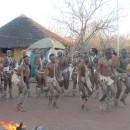
Personal Information
| How much international exposure did you have prior to this program? | 0-2 weeks |
Review Your Program
|
* Overall educational experience
Academic rigor, intensity, resources, etc. |
The academics at this program were an absolute joke. This was not a result of the program or its staff, but rather a result of the University of Botswana. Professors rarely showed up to class and when they did, they often ranted about various personal topics, talked in the native language, or made inappropriate jokes. The courses were subjectively and unfairly graded and it was not uncommon for incorrect grades to be reported or coursework to be totally lost. This is not to say that I did not learn anything this semester - I learned extremely important and useful cultural knowledge that I will value for a lifetime. However, academically, I lost out on an entire semester's worth of education. |
|
* Host Country Program Administration
On-site administration of your program |
The staff was extremely helpful and kind. They helped with all problems, both big and small, and did so efficiently and with a great attitude. They were always there to talk about absolutely any problems and made themselves extremely available to the students. I considered some of the staff members my close friends. While at times they lacked a certain level of professionalism, I am extremely grateful for them and my experience would not have been the same without them. |
|
* Housing:
How satisfied were you with your living arrangements? |
I lived with a host family and it was hands down the most challenging but rewarding aspect of my study abroad experience. The living conditions in my house were much worse than what I was used to. The frustrating part of this was that many of the requirements my program informed me would be met, were not met. It would have been easier dealing with the situation had I been given different expectations. However, as challenging as it was, I learned so much and I would highly recommend opting for a homestay experience if your program offers that as an option. |
| * Food: |
The local Setswana food was, in my opinion, pretty delicious. As with any country, it definitely takes some adjustment getting used to not only the food, but also portion sizes, meal times, and eating rituals. However, the food in Botswana was generally well-balanced and easy to stomach. Restaurants of different cuisines (including European/American) were available to add some variety, and grocery stores carried many American comforts at reasonable prices. |
|
* Social & Cultural Integration:
How integrated did you feel with the local culture? |
Because I chose to live with a host family, I felt extremely integrated into the culture. My family taught me what it was like to be a Batswana - they took me to funerals, weddings, and local events, taught me how to cook their food, and helped me get a handle on the language. I also mastered the public transportation system and made many local friends from around my neighborhood. |
|
* Health Care:
How well were health issues addressed during the program? |
Before traveling to Botswana, I received a Yellow Fever vaccine, a typhoid vaccination (shot), and a hepatitis booster. I also was prescribed malaria prophylaxis to take every day while I was there, and traveler's sickness antibiotics in case of emergency. However, all of these vaccinations and medications were really only necessary when traveling to other countries. The region of Botswana I was staying in was not a malaria-zone, and only South Africa required the Yellow Fever vaccine. The water was considered safe to drink and while some people had minor problems with it, I did not have any. CIEE had a well-qualified, private doctor that we could visit if we had any health issues. Although she was a little expensive, the expenses could eventually be covered by traveler's insurance. While I did not personally have any health crises, I would say that when my fellow students did, the program staff were extremely helpful in getting them the care they needed and the sick students generally received the medication they needed to get better. |
| * Safety: |
As with most countries, there were definitely some safety concerns in Botswana that required me to be a little more vigilant than I need to be in America. There were a couple safety scares throughout the semester but the program staff definitely prepared us for this during orientation and were extremely helpful in dealing with the crises. Overall, if you were smart, paid attention to your surroundings, and didn't walk around at night alone, then it was unlikely anything bad would happen to you. |
| If you could do it all over again would you choose the same program? |
Yes
|
Finances
|
* Money: How easily were you able to live on a student's budget?
(1 = not very easy/$200+ on food & personal expenses/week, 2.5 = $100/week, 5 = very easily/minimal cost) |
The cost of living was very cheap in Botswana and if you wanted to live on a very low budget, that was definitely possible. It definitely varied from person to person and their personal preferences, but overall, the country was very cheap. |
| Not including program expenses, about how much money did you spend on food and other expenses each week? | $50.00 |
| Do you have any general money-saving tips for future study abroad participants? | My biggest expense was going out to eat constantly. While it was fun and a good social/bonding experience, it definitely added up. I suggest taking advantage of university/dorm meals (they are extremely cheap) and taking advantage of meals provided by your host family, as they are technically included in the cost of the program. |
Language
| * Did your program have a foreign language component? | Yes |
|
How much did the program encourage you to use the language?
0 = No encouragement, 5 = frequent encouragement to use the language |
We had a class for the first half of the program that taught us many of the basic greetings and phrases we would need in everyday life. While they didn't exactly "encourage" us to use the local language, they provided ample resources and advice if a student desired to further explore the language. |
| How would you rate your language skills at the beginning of the program? | None |
| How would you rate your language skills at the end of the program? | Beginner |
| What was the highest level language course you had completed prior to departure? | None. |
| How many hours per day did you use the language? | |
| Do you have any tips/advice on the best ways to practice the language for future study abroad participants? | If you really want to work on your Setswana, there are some YouTube videos that help you practice the sounds and a few words. However, I don't think it's really necessary to go in there with much prior experience and the program teaches you the basic phrases that are useful to know. |
Other Program Information
|
* Where did you live?
Select all that apply |
|
|
* Who did you live with?
Select all that apply |
|
|
* Who did you take classes with?
Select all that apply |
|
| About how many local friends did you make that you will likely keep in touch with? |
A Look Back
| * What did you like most about the program? |
|
| * What could be improved? |
|
| * What do you know now that you wish you knew before going on this program? | While I knew that I was going to be a minority in Botswana, I did not realize that white people were so highly focused upon and at times, very discriminated. I was not used to this attention and it caused a lot of anger and frustration throughout my experience. I wish I knew this more before going. |
Reasons For Studying Abroad
| To help future students find programs attended by like-minded individuals, please choose the profile that most closely represents you. |
The Nearly Native or Trail BlazerCraving the most authentic experience possible, perhaps you lived with a host family or really got in good with the locals. You may have felt confined by your program requirements and group excursions. Instead, you'd have preferred to plan your own trips, even skipping class to conduct your own 'field work.' |








